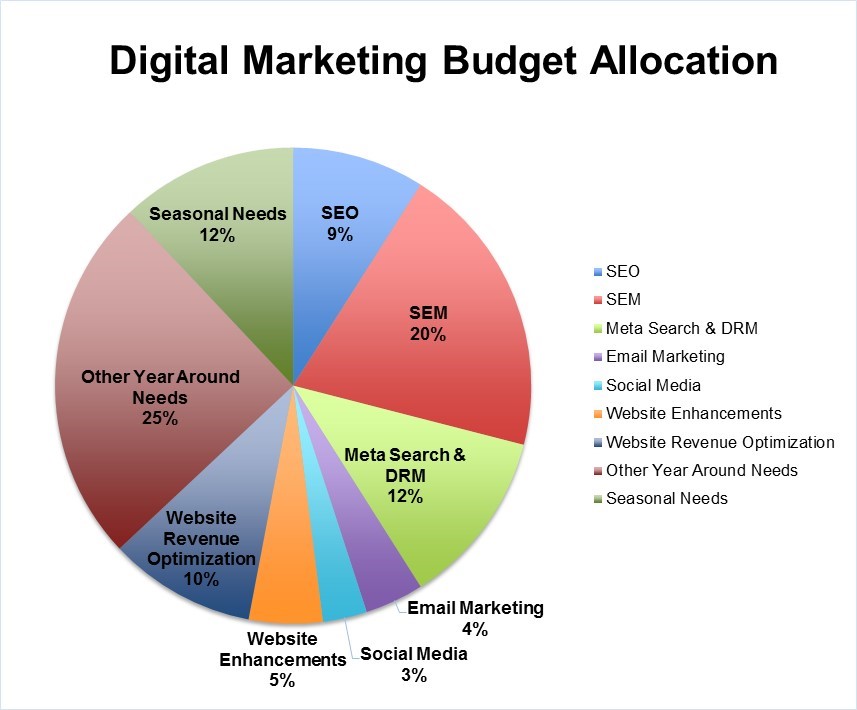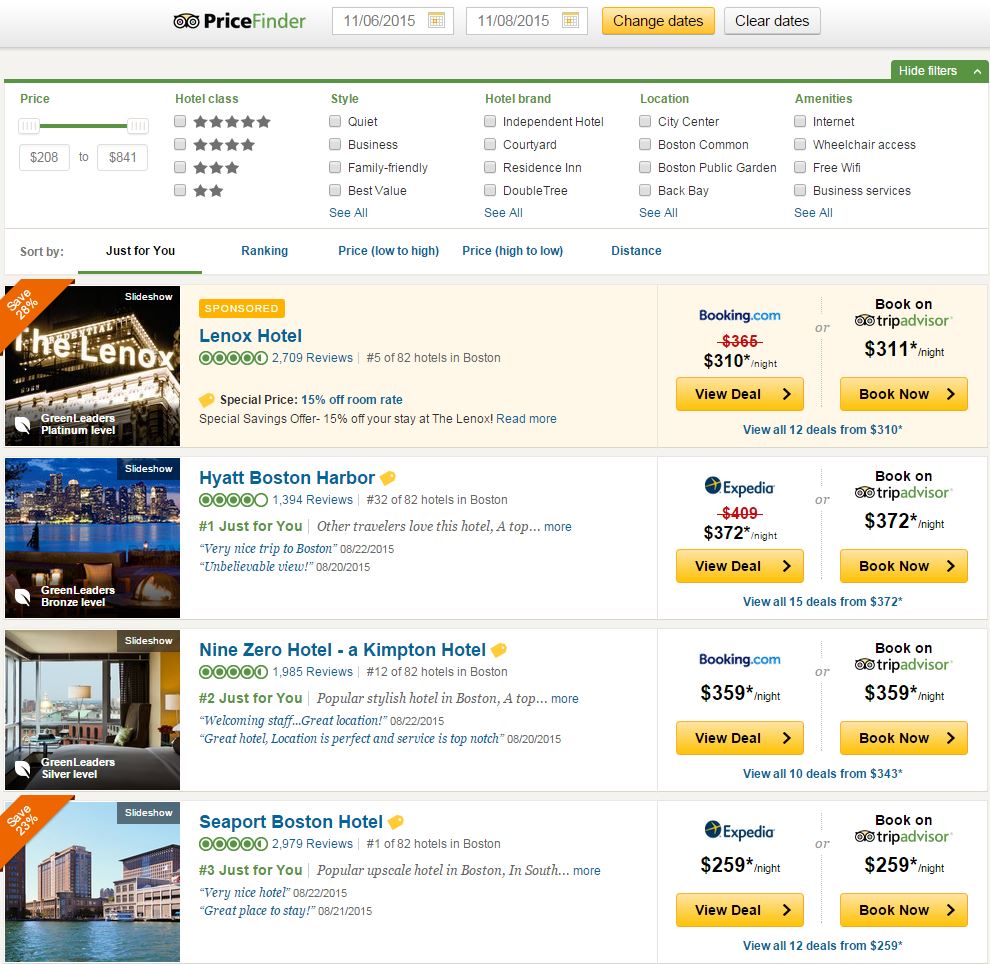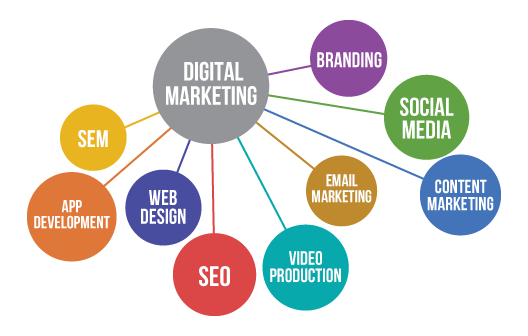Digital Marketing Budgets for Independent Hotels: Continuously Shifting to Remain Competitive in the Online World
By Leora Halpern Lanz and Megan Carmichael
The hotel marketing budget, typically amounting to approximately 4-5% of an asset’s total revenue, must remain fluid, so that the marketing director can constantly adapt the marketing tools to meet consumer communications methods and demands. Though only a small amount of a hotel’s revenue is traditionally allocated for the marketing budget, the hotel’s success is directly reliant on how effectively that budget is utilized. Thus far in 2015, over 55% percent of hotel bookings are happening online, and mobile search queries have surpassed desktop queries (Google Research 2015). So as the world becomes deeply immersed in today’s digital universe, the marketing departments of independent hotels have directed their resources to the digital stratum, a necessity in today’s cluttered marketing environment and competitively branded arena.
The Continuous Adaptation
Such a stratum, though very complex, is extremely flexible. “The beauty found in digital marketing is in the ability to adapt until a niche is found,” says Jay Haverty, Chief Executive Officer of d50 Media, a marketing communications agency based in Chestnut Hill, Massachusetts. “If one method is not proving to be a success, it is easy to shift those resources into other methods until efficiency through volume is achieved.” Haverty notes that 25-30% of most marketing budgets (not necessarily in hospitality) are now in digital marketing, but within the last year, some budgets are showing 50% of their resources turning to the digital world. He also notes that 6-12% of the digital marketing budget is going to consumer-facing marketing, which includes tactics such as search engine marketing and promoted advertisement on social media platforms including Facebook and Twitter.
Looking at the hospitality industry specifically, Max Starkov, CEO of HeBS Digital, and Mariana Mechoso Safer, Senior Vice-President of Marketing at HeBS Digital (Hotel eBusiness Strategies), state in The Smart Hotelier’s Guide to 2015 Digital Marketing Budget Planning, that 75% of the (hotel’s) marketing budget should be allocated to digital marketing. Why such an increase compared to the general marketing budget statistics provided by Haverty? The hospitality industry is wholly reliant on word of mouth, as it is the simplest distribution channel for a business. Guest loyalty does generate business, yet positive reviews provided by word of mouth marketing encourages new guests and higher revenue margins. In a study done on hotel bookings by TripAdvisor, reports show that out of 12,659 responses, 77% of those travelers choose to use reviews and recommendations from the website before booking a hotel room. Such a statistic speaks loudly to the dire necessity for an online presence that is not only informative, but distinct and able to be discovered among the “clutter” of hotel advertising and promotion.
Digital Budget Allocation
Regarding the marketing budget, independent hotels, particularly those with no affiliation to a soft brand or alliance with a marketing consortium of some manner, may need to spend more dollars on their marketing than those that are branded. Lesley Silberstein, Corporate Director of Sales and Marketing for Boston-based Saunders Hotel Group, warns of the lack of “the safety nets” that a brand usually provides. Silberstein, also an adjunct professor at Boston University’s School of Hospitality Administration, advises, “Independent hotels have to be efficient and prudent. They have to be far more conscious about which channels they determine to utilize, especially when new tools are continually coming along.” When new, innovative concepts such as Dynamic Content Personalization, , come to light, independent hotels must be educated and handle their research and due diligence. If the return on investment (ROI) is lower than expected, there is a risk of wasted dollars and even a tarnished reputation leading to a more difficult recovery. But the fear of lost dollars has been over-shadowed by the bright light that is innovative digital marketing. For independent hotels, website enhancements and website revenue optimization strategies provide for a strong foundation for the digital marketing approach.

Website Enhancements
Website redesign is a never-ending challenge, and one that is easily lost or mismanaged when a short-cut route is taken. Less costly designs and/or functionality may save money upfront, but in the long term, lost revenue damages the hotel’s bottom line. This is especially true of independent hotels, as they do not possess the benefit of a brand’s reputation to depend upon. Independent hoteliers must take the extra step of caution when investing in the proper website presentation and function for their property. According to Starkov, CEO, and Sara O’Brien, Associate Director of Marketing at HeBS Digital, website re-design and enhancement should constitute 4-5% of the digital marketing budget. Hoteliers need to appeal to consumers on multiple devices, thus the need for the “responsive” website. Desktop users are looking for as much information as possible, whereas mobile users require short, slimmed down content. The tablet user desires deep, visually enhanced content. The more satisfactory the consumer experience, the more likely a transactional booking will occur.

Website Revenue Optimization Strategies
In a survey asking 376 hoteliers where they see the most ROI, a staggering 70% said they see the best results from their online investments (Cullen, 10). Approximately 73% of those same hoteliers say they depend upon in-house staff to operate and manage their digital marketing efforts, but recent research from the Hospitality Sales & Marketing Association International (HSMAI) indicates that increased ROI would result from actually outsourcing these efforts to an electronic marketing firm. Such outsourcing would generate more visibility and revenue, and ultimately prove more cost-effective. According to HeBS Digital, this avenue of consulting should approximate 8-10% of the digital marketing budget. The revenue optimization consultant, whether in-house or outsourced, is expected to utilize a variety of digital marketing efforts in the hopes of maximizing revenue. For independent hotels, these efforts include, but are not limited to, Search Engine Optimization (SEO), Search Engine Marketing (SEM), meta search, Dynamic Rate Marketing (DRM), email marketing, and a strong Organic and Paid Social presence.
1. Search Engine Optimization (SEO) & Search Engine Marketing (SEM)
Together, SEO and SEM could constitute approximately 27-29% of a hotel’s digital marketing dollars. SEO is extremely vital when having to meet standards set by search engines. Search engines demand a constant improvement of unique web content, but they also demand the rejuvenation of already existing content. SEO is where independent hotels have the opportunity to penetrate the crowded arena, as they strive to remain unique and memorable in their guest experience. Safer also notes that it is important for SEO to align with SEM for greater ROIs. SEM, including paid search, which may total 20-22% of the digital marketing budget, has experienced the most change over the years. SEM is far more complex today and also requires a stronger time commitment to properly execute. Increased competition with Online Travel Agencies (OTAs) adds to such complexity for branded hotels, as they are insistently commanding brand key words. Again, an advantage for independent hotels can be found. Independents do not rely on brand key words when executing SEM; their challenge is rather to stand out among the Goliath brands.
2. Meta Search Marketing & Dynamic Rate Marketing (DRM)
For independent hotels, meta search marketing is a must, as it is part of the constant effort to shift Internet data share away from OTAs and increase direct bookings. It should equal approximately 11-12% of the digital marketing budget. In the hospitality industry, meta search marketing is a form of online advertising that requires real time room rate and availability information. Meta search site TripAdvisor receives 375 million unique monthly visitors (TripAdvisor 2015). Its reviews on properties serve as a conduit to direct bookings for hotels, also bringing meta search sites even closer to the purchasing point. “Contrary to some perceptions in the industry, meta search is not a distribution channel, nor is it a ‘set and forget’ marketing initiative,” Safer notes. “It is a cost-per-click (CPC) advertising format, where the advertiser only pays when someone clicks on the listing and is then led deeper into their booking engine.”

Yet another advantage of search engine marketing and CPC or pay-per-click (PPC) marketing is the ability to “turn it off” when it doesn’t work – or when it works for that matter. Marje Bennetts, General Manager of the Beach House Hotel in Hermosa Beach California remarks that the retail-like advertising response of pay per click can work wonders when trying to fill “need dates.” When advertising on the OTAs for example, for a particularly slow period for that part of Southern California, “we can immediately fill rooms at an attractive rate thanks to the power of the PPC advertising. When we fill rooms to a certain point, and then have less inventory to work with, we can ‘turn off’ the faucet so to speak. At that point, the guest books our rooms from other mechanisms and we can achieve a higher ADR (average daily rate) for those remaining rooms.”
DRM goes hand in hand with meta search, as it is a direct-response marketing system that allocates for real-time hotel inventory and pricing. When a consumer accesses hotel information on TripAdvisor, they are not only able to access a plethora of reviews, but also the real time ADR. If a consumer were to go to the property site and book through the CRS (central reservation system), they would find an identical ADR. This is a prime example of a meta search site making use of DRM. It is cost effective and takes little time, which is why so many hoteliers reap its benefits today.
3. Email Marketing
Email marketing gives hotels the opportunity to reach as many potential and prospective guests as possible, given the multi-device era in which we live. This, suggests HeBS Digital, should realize 4-5% of the independent hotel’s digital marketing budget. What is important is that each email is optimized as responsive for desktop, tablet, and mobile devices. Email marketing secures great advantages with its use of dynamic content personalization. Data collected on website viewers is translated into personalized emails — about information they were just viewing on the website. Pair email marketing with social media presence (a suggested 2-4% of the digital marketing budget) and an independent hotel has the ability to appeal to a user on multiple communication levels.
4. Organic & Paid Social Media
Instagram has accumulated 77.6 million users in 2015 in the U.S. alone, 50% of whom are millennials (Zero-In). Utilization of this social media channel could enable an independent hotel to distinguish itself among current buyers, and also imprint a lasting message and/or visual for the Instagram viewer. The key to a good social media presence is a strong foundation (Starkov and Safer 9). This means that in addition to making use of various social media platforms, the hotel must execute this properly. Facebook, Twitter, and Google+ pages, for example, should be an extension of the property website and part of the hotel’s online network presence. The social sites should continuously be updated in order to reply to customers promptly, provide viewers with the most current of information, and perform its function in real time effectively.
As Haverty notes, a strong, organic, social presence is essential, but it will only take a brand so far. Looking past the likely sizeable core of vocal brand ambassadors that carry its weight on social channels, Paid Social becomes vital. Its promotional and advertising campaigns are both robust and well-designed, effectively aiming at both increasing the amount of bookings, and building an email database. This social channel in turn is required to be competitive, especially for operators looking to survive against larger brands. “Paid Social – particularly on Facebook, Pinterest and soon on Instagram can have a tremendous return on investment,” notes Haverty, “Facebook, especially, allows for extreme niche targeting, and provides access to audiences flagged for business and leisure travel, vacationing, cruises, and the like; other interest and behavioral targeting layers combined with age, life stage, and income targeting can make for extremely high-performing ad campaigns”
5. Contingency or Reserve Funds
Not always available for independent hotels with tight marketing budgets, but when there is the ability to reserve dollars for unanticipated advertising needs during the fiscal year or the desire to experiment with new techniques of digital marketing, reserve marketing funds would be fundamental to ‘line item in.’
What the Future Holds
The budget line items indicated above are merely educated suggestions. How each independent hotel determines to allocate its budget depends on its comfort with the channel, willingness to take risks, and measured tracking of the ROI. The beauty of digital marketing is in its fluidity. Hotels have the ability to experiment with digital marketing initiatives, and if the results are ineffective, the marketing director can redirect the efforts essentially immediately. As Greg Bodenlos, brand marketing manager at The Charles Hotel in Cambridge, Massachusetts pragmatically stated, “independent hotels have to do more than branded hotels with less of a budget.” These hotels have the unparalleled opportunity to be completely unique, but that comes with its own set of challenges. It will be interesting to see where the digital marketing stratum leads us as consumers, as hoteliers, and as hotel marketing managers. The constant innovation and vivacity has pushed marketing far beyond what was ever expected, and so, the future seems to be both excitingly complex, while curiously bright.
The authors wish to acknowledge Carly Antonioli, a student at Boston University’s School of Hospitality Administration, for research that contributed to the contents of this article.

 Leora Halpern Lanz is the president of LHL Communications, a hospitality content marketing, branding and media relations advisory firm. LHL clients include hotels, hospitality investment conferences, leisure products, hotel management companies as well as other industry related services. Previously, for 15 years Leora served as global director of marketing and head of the marketing practice for hospitality consulting giant HVS. Prior to HVS, she served for 10 years as director of public relations and advertising for ITT Sheraton Hotels of New York and for 5 years as director of public relations for the Greater Boston Convention &Visitors Bureau. She is currently also a full-time lecturer at Boston University’s School of Hospitality Administration.
Leora Halpern Lanz is the president of LHL Communications, a hospitality content marketing, branding and media relations advisory firm. LHL clients include hotels, hospitality investment conferences, leisure products, hotel management companies as well as other industry related services. Previously, for 15 years Leora served as global director of marketing and head of the marketing practice for hospitality consulting giant HVS. Prior to HVS, she served for 10 years as director of public relations and advertising for ITT Sheraton Hotels of New York and for 5 years as director of public relations for the Greater Boston Convention &Visitors Bureau. She is currently also a full-time lecturer at Boston University’s School of Hospitality Administration. Megan Carmichael is a student at Boston University’s School of Hospitality Administration (SHA). Her studies and areas of interest include sales and digital marketing, and integrated marketing communications. Megan is currently working with LHL Communications, and serves as a peer mentor for incoming Boston University hospitality students. Beyond her studies in SHA, Ms. Carmichael is pursuing a minor in Communications at BU’s College of Communications
Megan Carmichael is a student at Boston University’s School of Hospitality Administration (SHA). Her studies and areas of interest include sales and digital marketing, and integrated marketing communications. Megan is currently working with LHL Communications, and serves as a peer mentor for incoming Boston University hospitality students. Beyond her studies in SHA, Ms. Carmichael is pursuing a minor in Communications at BU’s College of Communications
37 comments
Hi Leora and Megan,
Well explained, thank you. I totally agree that SEO and SEM has become more complex in these recent years. But if we continue to follow the recommended guidelines as to what pleases the search engines we will satisfy both the search engines and consumers. It was a pleasure reading your post. Thank you.
Pl,tell me ,I am unknown for hotel industry,but I want to make a small hotel in kedarnath,sugetion given
In May 2015, the variety of Kuwaiti tourists who visited Egypt increased by seventy four.four per cent in comparison with Might 2014.
Great Article, Now A Days, over 78% percent of hotel bookings are happening online, and mobile search queries have surpassed desktop queries. so we can use that digitalization affects our lifestyle. As a Hotel industry if you want to flourish you need to invest in PPC and SEO at the same time.
Truly Asia Boutique Hotel is an excellent accommodation located in the sprawling city center of Thamel. Our hotel is about affordable luxury and it exemplifies style, accommodation, amenities, cuisine and accommodation. It is an excellent addition to Thamel and Kathmandu and is a wise choice for national and international tourists for accommodation
Annapurna Sanctuary still remains ageless despite the influx of trekkers in the region. The diversion of majority of trekkers in the Annapurna base camp trail has left this trek still to its original state. This trek is fabulous and offers magnificent views, without having to strenuously climb high altitudes. En route you will be awestruck by the hospitality of generous Gurung communities, soothing hot springs, gushing tributaries, and lush green hills.
Are you willing to become a mountaineer ? Do you want to embark on the journey that many do not because of fear ? If yes, this trek and Peak climbing is for you. Island Peak Climbing with Everest base camp is for adventurous souls looking to conquer fear. Island Peak is one of the first level peaks in Nepal and often a practice peak for those attempting Everest. Although it may be around 6000 meter in elevation, it is no ordinary peak and will put you on your knees if you let it.
Thanks for your topic for Digital Marketing Budgets for Independent Hotels: Continuously Shifting to Remain Competitive in the Online World. We also like some of topic this type https://bdicon.com/social-media-marketing/. Thanks you so much for your good article.
Thanks for your topic for Digital Marketing Budgets for Independent Hotels. its great and timely. keep up the good work.
Hi, nice post i’m very enjoy reading it, thumbs up!
Design Outsource here to say nice post, thanks for sharing such beautiful blog
Hi, nice post i’m very enjoy reading it, thumbs up!
It very rare in the other regions to find lakes made out of glacier deposits and in plenty. This trek takes you to beautiful emerald green and turquoise lakes. The lakes reflect the most magnificent reflection of the highest mountains. To add up, it takes you to the highest walkable passes, which is as well a fantastic vantage points. The vantage point offers views of one of the world’s highest mountains. Cho La offers the view of Everest and unlike the view from Kala Patthar. From Chola pass you can see the Everest dominating the entire landscape. Finally, we as well see the Everest base camp and the Kala Patthar which is the zenith of the trek
I really loved this article.
Nowadays 90% of hotel and other hospitality sector bookings are occurring online and quite to my surprise in the travel sector, the mobile searches have well surpassed the desktop ones as per analytics reports.
Therefore, for the hospitality sector it is well recommended to invest in the PPC and SEO campaign.
Competition in the current SEO environment is getting stronger day by day. Newer methods are needed to optimize them more and increase competitiveness with competitors.
I want to know that did this digital marketing strategy will work for the book writing industry. I am having a business website of ghost writers melbourne for that I am looking for the best digital marketing strategy which I can adopt to do, and as you give a brief about it so I am glad to see that and need to know from you about it, kindly do let me know that how can I contact you and get more information about it.
I am so happy to be part of this wonderful blog. I love to do digital marketing but does not have much knowledge about it. I love to do promotion of oil and gas jobs in mangalore
Digital marketing is becoming increasingly important in today’s business landscape, as more and more consumers are turning to the internet to research and purchase products. By working with a web designing company in Australia and developing a comprehensive digital marketing strategy, businesses can improve their online presence and achieve their marketing goals.
As online exam help services become increasingly popular, companies in this industry must allocate adequate budgets for digital marketing to remain competitive and attract potential clients. In this dynamic landscape, regularly assessing and adjusting digital marketing strategies can help these companies stay ahead of the curve and effectively promote their online exam help offerings to students and professionals alike.
Digital marketing involves using various online channels to promote and advertise products or services to potential customers. While the primary focus of digital marketing is on content and messaging, graphic design services also plays a critical role in its success. Effective graphic design helps to enhance the overall aesthetic appeal of a brand’s digital presence, which can help to increase engagement and ultimately, conversions.
With advancing technology, some water-saving shower heads now incorporate smart features to maximize efficiency.https://showerheadwave.com/
Digital marketing budgets for independent hotels can vary depending on various factors such as the size of the hotel, its location, target market, and overall business goals. As for the USA ghost book writers, it’s important to note that hiring a ghostwriter is a separate expense from the digital marketing budget. Ghostwriters can assist independent hotels in creating compelling content such as blog posts, articles, and even e-books, which can be used as part of their content marketing strategy.
Digital marketing budgets play a crucial role in the success of independent hotels in today’s competitive online world. To stay competitive and attract guests, independent hotels need to continuously adapt their digital marketing strategies. While it may seem unrelated, the use of sewer line cameras can be metaphorically applied to the context of digital marketing budgets for independent hotels. Just as these cameras are used to identify and address issues in sewer lines, independent hotels need to regularly inspect and evaluate their digital marketing efforts to identify any shortcomings and make necessary adjustments.
In the ever-evolving digital landscape, independent hotels must adapt their marketing strategies and allocate budgets wisely to remain competitive in the online world. Just as truck repair service need to stay updated with the latest technology and tools to effectively service heavy vehicles, hotels must continually assess and adjust their digital marketing budgets to leverage new trends, platforms, and customer preferences.
Digital marketing budgets for independent hotels play a crucial role in maintaining competitiveness in the ever-evolving online landscape. In today’s digital age, consumers heavily rely on online platforms to search for and book accommodations, making it imperative for independent hotels to allocate substantial resources to their digital marketing efforts. A1 assignment uk, as a reputable academic service provider, can offer valuable insights into crafting effective digital marketing strategies for independent hotels.
Totally convinced. Thanks for the informative blog on why businesses from the hospitality industry should keep an eye on the digital marketing. In fact, digital marketing has become one of the important mediums to bolster branding and reach to the target audience in a cost effective way, especially if you compare the cost with that of traditional marketing methods and strategies. For instance, the content marketing ROI is much lower than the ROI you can generate through television advertisements or other traditional marketing.
Yeah, but which one is more effective? traditional or digital marketing, especially if the brand is well established.
This is fantastic research, particularly, I enjoyed the section about Digital Budget Allocation. The graphic was helpful in seeing how independent hotels think about these things. It’s interesting to see that even back in 2015, SEO and website enhancements such as professional brand videos were top of mind.
In the dynamic landscape of the hospitality industry, independent hotels are increasingly recognizing the significance of allocating digital marketing budgets to stay competitive in the online realm. The question of whether one can i pay someone to take my exam raises ethical concerns, as it goes against academic honesty and the principles of fair evaluation. Independent hoteliers can draw parallels between the need for adaptability in the digital marketing landscape and the importance of maintaining ethical standards in academic pursuits, ensuring a balanced and principled approach in both domains.
In the ever-evolving landscape of hospitality, independent hotels face the challenge of staying competitive in the online world. The key to success lies in strategic digital marketing, and this guide, “Digital Marketing Budgets for Independent Hotels: The ebook cover design itself captures the essence of this dynamic shift, featuring vibrant visuals symbolizing the constant motion of the digital realm, and it serves as an enticing gateway to a resource that empowers independent hotels to thrive in the competitive online market.
Digital marketing budgets for independent hotels are undergoing continuous shifts to remain competitive in the dynamic online landscape. The goal is to adapt to changing digital platforms, consumer preferences, and emerging technologies to maintain a strong competitive edge. In this context, the phrase take my TEAS exam for me appears unrelated to the topic of digital marketing budgets for hotels. If you have a specific question or request related to TEAS exams, please provide more details so I can assist you accordingly.
Digital marketing budgets for independent hotels are constantly evolving to maintain competitiveness in the dynamic online landscape. While discussing digital marketing budgets is relevant, the mention of pay someone to do my online class seems unrelated. If you have specific questions related to digital marketing or online classes, feel free to provide more details for a more accurate response.
In the realm of independent hotels, the allocation of digital marketing budgets has become a dynamic and essential strategy to stay competitive in the online landscape. Similarly, in the educational sphere, the importance of adapting to the online environment is evident, with services like take my TEAS exam for me emerging as solutions to meet the evolving needs of students. By investing in digital marketing, independent hotels can ensure their visibility and appeal to a broader audience.
Great article, In the highly competitive insurance sector, where products often resemble each other closely, insurance marketing teams face the challenge of distinguishing their brands and engaging with customers. The indirect nature of customer outreach, through financial advisors and institutions, adds complexity to marketing efforts.
Moreover, the intangible benefits of insurance make communicating its value proposition more challenging. Digital marketing tools offer a solution, enabling precise audience targeting and result measurement within tight budgets.
The insurance industry is saturated with national brands making a lot of noise, making it tough for local insurance agencies to be heard by consumers. Smart marketing strategies are necessary so that an insurance agency can stand out from the national and local competition.
However, navigating the vast landscape of digital marketing strategies, channels, and analytics can be daunting for marketers, especially given its constant evolution.
Digital marketing budgets for independent hotels are continually evolving to maintain competitiveness in the online realm. In parallel, it’s essential to acknowledge the significance of digital marketing in sectors beyond hospitality, such as 24 hour elderly care. Similar principles apply in adapting marketing budgets to leverage digital tools for reaching and engaging with the elderly care community, promoting services, and fostering trust and credibility.
As an independent hotel owner, staying competitive in the digital landscape is crucial for attracting guests and driving revenue. Allocating a portion of our budget towards digital marketing allows us to reach our target audience effectively. Considering the dynamic nature of online platforms, it’s essential to continuously assess and adjust our marketing strategies to stay ahead. Moreover, partnering with reputable villa renovation companies Dubai like CCGK can enhance our property’s appeal, aligning with our digital marketing efforts to create a compelling guest experience.
When allocating digital marketing budgets for independent hotels, it’s crucial to consider various factors to maximize return on investment (ROI). Firstly, prioritizing a robust online presence is key, making unlimited web hosting plans an attractive option. These plans offer scalability and reliability, ensuring the hotel’s website can handle traffic influxes and provide a seamless user experience. Investing in search engine optimization (SEO) is imperative to enhance visibility on search engines, driving organic traffic.